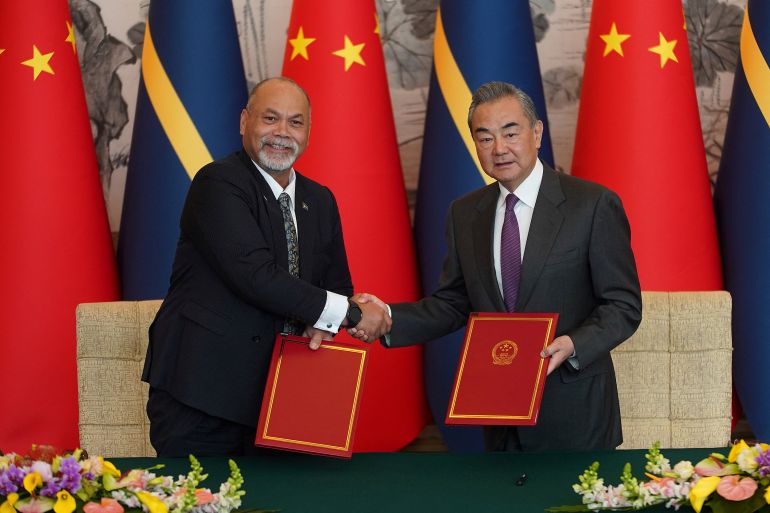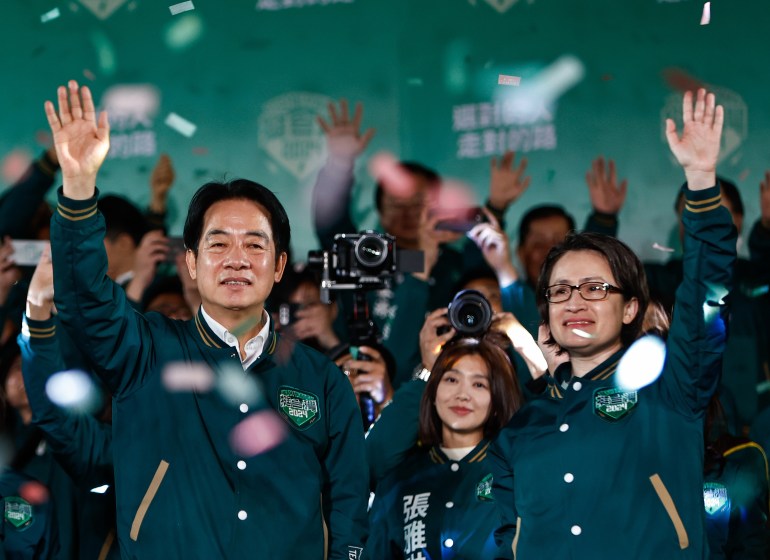Nauru seals diplomatic ties with China after dumping Taiwan
The tiny Pacific island broke ties with Taipei following elections that angered China.

China and Nauru have formally agreed to resume diplomatic relations after the tiny Pacific island severed ties with Taiwan last week.
A signing ceremony to seal the renewal of relations took place in Beijing on Wednesday. Nauru deepened Taipei’s diplomatic isolation by breaking ties on January 14 following Taiwanese elections that angered China.
Keep reading
list of 4 itemsChina accuses US of ‘slander’ as diplomatic spats surround Taiwan election
China vents fury at Philippines over Taiwan congratulations
Taiwan ruling party’s Lai wins presidential election
Chinese Foreign Minister Wang Yi and Nauru counterpart Lionel Aingimea raised glasses after signing a document formalising the rapprochement.
“Although China and Nauru are geographically far apart and separated by vast oceans, the friendship between the two peoples has a long history,” said Wang.
Aingimea said Nauru was looking forward to a “new chapter of the relationship of Nauru and China”, which would be built on “strength, built on development strategy”.
Poaching allies
Nauru broke ties with Taipei earlier this month after independence-leaning candidate William Lai Ching-te, reviled by Beijing, won the Taiwanese presidential election.
The tiny island nation swiftly announced that it will no longer recognise Taiwan as a separate country. Beijing insists that the island is part of China’s territory.
Located in the South Pacific, Nauru has switched loyalties in the past. In 2002, it recognised China after 22 years of diplomatic relations with Taiwan. In 2005, it switched back to Taipei.
The latest switch came as a blow to Taipei. It left Taiwan with just 12 allies that officially recognise the island as a sovereign state, although it enjoys strong unofficial relations with the United States, Japan and other nations.
China has been gradually poaching Taiwan’s diplomatic allies, partly to punish the ruling Democratic Progressive Party that advocates maintaining the status quo under which Taiwan has its own government, military and de facto independent status. The People’s Republic of China (PRC) has never governed the island.
Ten countries have switched ties from Taipei to Beijing since the initial election of DPP President Tsai Ing-wen in 2016.
China says that Taiwan must come under its control at some point and has staged military drills around the island to demonstrate its determination.
After Nauru announced it was breaking ties, Taiwan’s Deputy Foreign Minister Tien Chung-kwang said China’s one-party Communist government’s intention was to “attack the democracy and freedom that the Taiwanese people are proud of”.

Diplomatic controversies
Beijing last week hit out at the United States after it decried Nauru’s switch.
“Taiwan is a reliable, likeminded, and democratic partner,” the US Department of State said in a statement. “The PRC often makes promises in exchange for diplomatic relations that ultimately remain unfulfilled.”
China accused the US of “blatantly making irresponsible remarks about a decision made independently by a sovereign state”.
“This seriously violates the one China principle … seriously interferes in China’s internal affairs, and seriously violates basic norms of international relations,” said Ministry of Foreign Affairs spokesperson Mao Ning.
China also summoned the Philippine ambassador after Manila congratulated the winner of Taiwan’s presidential election. Beijing had warned Manila “not to play with fire”.